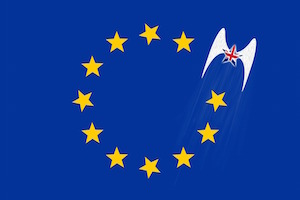By Dean Levine
Last year, the UK shocked the world when it voted to exit the EU. Informally referred to as Brexit, the UK’s decision to leave the EU means that the country will no longer be able to trade freely with other EU nations once article 50 is finally submitted.
Obviously, Brexit comes with several consequences. A smaller market means that businesses will lose money from said markets that they used to operate in. It could also mean a labor shortage, which could result in UK citizens venturing abroad to find better working prospects.
FXCM outlined some of the positives to come from Brexit, such as reduced taxes for UK citizens and a reduction in the number of immigrants that the state accepts per year. But despite Brexit’s benefits, the UK economy has been hit hard, particularly regarding international trading.
The problem doesn’t stop in the UK. Since the US is a trade partner of the UK, North America may also suffer deficits because of Brexit. UK companies that get their raw materials, or any other product in the U.S. could reduce their orders due to financial restraints and an unstable economy.
While it will take months, even years, for Brexit to take full effect, professionals are positive that things won’t be as bad as first thought. Here is what some industry leaders from leading events and tourism companies think about last year’s Brexit vote.
Kevin Jackson, Chair for the International Live Events Association (ILEA)
Kevin Jackson, CEO of the U.S.-based ILEA says that despite not knowing what will happen over the next two years, event professionals shouldn’t be too concerned. After all, the event industry is a robust one, and, brands will always need to market their products.
“I don’t see long-term that we’ll be knocked off course,” says Jackson. “…We need to keep doing what we do best. We’re an events industry; there’s always a deadline and always a delivery and as long as we keep delivering we’ll be OK. As a creative and relationship-based industry we have to leverage those relationships to drive the industry forwards. No matter what’s going on with the government and the EU.”
Nick de Bois, Chair for the Events Industry Board
Despite Brexit, Nick de Bois thinks that the situation presents event organizers with terrific opportunities. After all, Brexit’s impact for the most part is still speculative and whatever happens in the next two years will be reflective of what businesses do today.
“The British events sector is hugely respected for its creativity and strength,” says de Bois. “Britain is open to doing business with the rest of the world. We can go far and drive relationships and do more around the world. It is an opportunity for the sector to do very well in markets we haven’t been as active in. I’m hugely optimistic for the sector.”
The U.S. economy is starting to recover, and analysts believe that this is what de Bois is talking about. UK companies can recover losses by partnering or expanding their services with U.S.-based events companies or by entering the territory to initiate business.
Kurt Janson, Director of Tourism Alliance
Kurt Janson, on the other hand, believes in involving the government in order to counter the impending effects of Brexit. By letting the government know what the tourism industry could face, better solutions will present themselves to businesses.
“We will be writing to the Government from the Tourism Industry outlining the main issues that the Government needs to address immediately to provide support for the tourism industry,” says Janson. “This includes countering negative perceptions of the UK as a welcoming destination in overseas markets, providing clarity that there will be no change in the current requirements for visitors to the UK for at least two years and providing reassurances to the large number of overseas workers in the UK tourism industry that they are valued and their right to stay in the UK is unaffected by the referendum.”
To sum it up, while these important industry leaders admit that Brexit brings uncertainty, opportunities to prosper in the coming years are not lost. Companies need to maintain good relationships with their European customers, and explore markets outside the Eurozone that are in need of their services to stay in business, and most importantly stay relevant amidst uncertain economic times.

Author Bio:
Dean Levine is a writer whose many interests lie in politics and finance. He’s a chartered accountant and keen gardener. When not working his 9-5 or slaving away in the garden, Dean enjoys nothing more than reading the latest fiction novels.
Click here to see original post

